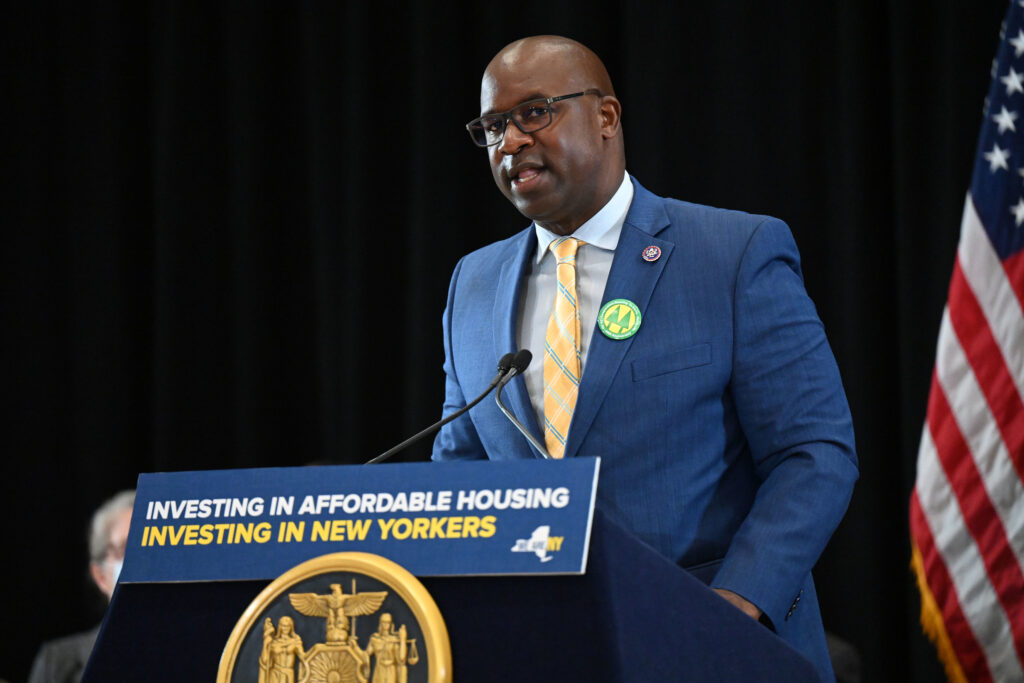
Photo courtesy of the Office of Gov. Kathy Hochul via Flickr
Before the Federal Reserve’s board of governors’ federal open markets committee meeting on March 20, 23 members of the House and Senate, led by the Congressional Progressive Caucus, called on Federal Reserve Chairman Jerome Powell to quickly present a plan to start lowering interest rates which the Caucus said continues to squeeze working people.
In a letter to the Federal Reserve, the lawmakers wrote, “With core inflation already having come into line with the Federal Reserve’s target, today’s excessively contractionary monetary policy needlessly worsens housing market imbalances and the unaffordability of home ownership, creates risks for banking stability, and could threaten the achievements of strong employment and wage growth and its attendant reductions in economic and racial inequalities.”
According to the Caucus, the Federal Reserve has increased interest rates 11 times since March 2022 despite what they said was clear evidence that inflation had cooled to within the Fed’s target range. They said this contradicted the Federal Reserve’s argument for suppressing employment and worker pay, and keeping mortgages high and loans unaffordable.
The members wrote, “The data over the last year also provide evidence that we may be on a faster productivity growth path, which will further alleviate inflationary pressures. None of these indicators correspond with an overly strong labor market that could threaten to spike inflation. The more realistic concern in light of these labor-market trends is that the Federal Reserve may wait too long to lower rates and allow tight monetary policy to reduce employment and real wage growth.”
The members added that the impact of the Fed’s decision was particularly acute amid a nationwide housing crisis. The lawmakers emphasized, “The housing market is facing major imbalances and making homeownership unaffordable due to persistently high interest rates. New housing starts have fallen almost 20 percent from their April 2022 level. Existing home sales have fallen to a 30-year low.”
The full letter can be read here. Signatories included U.S. Sens. Bernie Sanders (I-VT) and Elizabeth Warren (D-MA); U.S. Reps. Pramila Jayapal (WA-07), Becca Balint (VT-AL), Nannette Barragán (CA-44), Jamaal Bowman, Ed.D. (NY-16), Greg Casar (TX-35), Steve Cohen (TN-09), Veronica Escobar (TX-16), Jésus “Chuy” García (IL-04), Jonathan Jackson (IL-01), Steven Horsford (NV-04), Val Hoyle (OR-04), Jared Huffman (CA-02), Barbara Lee (CA-12), James P. McGovern (MA-02), Jerrold Nadler (NY-12), Alexandria Ocasio-Cortez (NY-14), Ayanna Pressley (MA-07), Delia Ramírez (IL-03), Rashida Tlaib (MI-12), Juan Vargas (CA-52), and Frederica Wilson (FL-24).
The Federal Reserve later announced interest rates would remain the same. Powell said during a press conference on March 20, “My colleagues and I remain squarely focused on our dual mandate to promote maximum employment and stable prices for the American people. The economy has made considerable progress toward our dual-mandate objectives.”
He continued, “Inflation has eased substantially while the labor market has remained strong, and that is very good news. But inflation is still too high, ongoing progress in bringing it down is not assured, and the path forward is uncertain. We are fully committed to returning inflation to our 2 percent goal. Restoring price stability is essential to achieve a sustainably strong labor market that benefits all.”
Powell added, in part, “Today, the FOMC decided to leave our policy interest rate unchanged and to continue to reduce our securities holdings. Our restrictive stance of monetary policy has been putting downward pressure on economic activity and inflation. As labor market tightness has eased and progress on inflation has continued, the risks to achieving our employment and inflation goals are moving into better balance.”
In other congressional news, as reported, the Congressional Hispanic Caucus addressed recent calls for U.S. Supreme Court Justice Sonia Sotomayer to step down amid health concerns.




